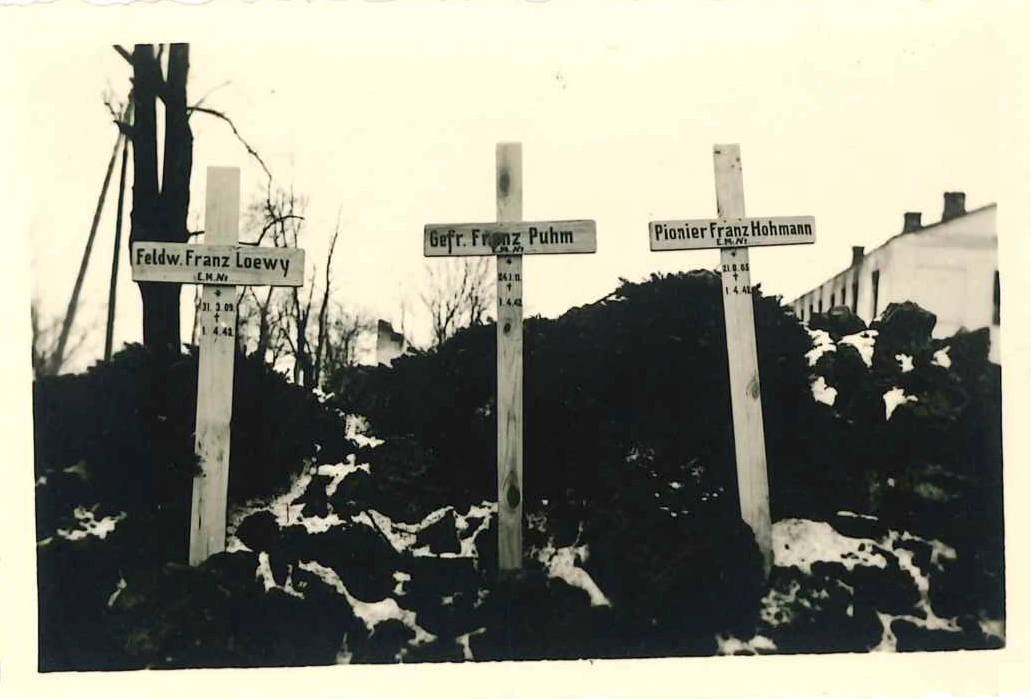All Souls
"Der Schwarze Schleier" | "The Black Veil", a poem by Erich Sonntag
One of the more curious and, frankly, very touching things about Erich Sonntag is that he tried to deal with his coming of age in the late 1930s and throughout the Second World War—by casting his emotions and experiences into words.
Now, since I began this journey—my very own armchair travels, if you will—I have learned quite many things about my grandfather who passed when I was six years old. It’s, I think fair to state that I don’t knew him, and what I (think I) remember may be figments of my own imagination mixed with family lore and the occasional anecdote.
One of the ways Erich Sonntag speaks to me, though, are his prose and poetic writings. His prose I found among his papers when I visited Vienna briefly last June; I learned about his poems more recently. My mother told me about a publication of poems written by veterans that he kept; I also learned that Erich Sonntag wrote a few poems, some of which are reproduced in the volume Herz under dem Helm [Heart under the Helmet], ed. by the Austrian Kameradschaftsbund, or veterans’ association, and published by Josef Faber of Krems in 1968. A few weeks ago, I sent an email to the Kameradschaftsbund—they didn’t know anything about the publication.
Given it’s All Souls Day today, I wish to offer you a glimpse into the mind, experiences, and soul, of Erich Sonntag.
Please keep in mind that I’m reproducing his poem “Der Schwarze Schleier”—“The Black Veil” in the German original followed by my translation. Note that while I consider my English (prose) skills quite o.k., I’ve never translated poetry; please let me know if you would like to offer a better translation of the poem.
I’ve also added two photographs from the Eastern Front that I know are not from him; my aunt gave them to me and I don’t know who took them or the like. Here, I’m using them as a ‘prop’, if you like, i.e., for purely illustrative purposes, but they do convey a message that resonates with the poem.
Enough from my side.
“Der Schwarze Schleier”, a Poem by Erich Sonntag
Hörst du das Rauschen
in allen Lüften?
Hörst du das Flüstern
aus tiefen Klüften?
Spürst du den Atem
des Todes nicht
kalt und voll Grauen
in deinem Gesicht?
Fühlst du die Brände
in deinem Herz,
leidenschaftlicher Bitte
rasenden Schmerz?
Hörst du die Klänge
der Orgel nicht?
In quälenden Stunden
ein Herz zerbricht.
Vernimmst du das Lied?
Es tönt von weit.
Es ist die große Klage
vom Krieg und vom Leid.
On the reverse, a few indications are given:
2 April 1942, Smolensk, before the burial of our comrades-in-arms
This is, by the way, why I know Erich Sonntag was not there: he deployed to the Eastern Front on 30 July 1942 (from Vienna) and his unit arrived in Orel on 4 Aug. 1942 (imagine that kind of railroad travel-time); his “baptism of fire” occurred on 11 Aug. 1942.
“The Black Veil”, a Poem by Erich Sonntag
Do you hear the rumbling
all around?
Do you hear the whisper
from deep gorges?
Don’t you feel
the breath of Death,
cold and full of dread,
in your face?
Do you feel the passion
in your heart,
a passionate yearning
of raging anguish?
Can you hear the music
of the organ?
In excruciating hours
a heart breaks in two.
Do you hear the song?
It soundeth from afar.
It is the great lament
of war and suffering.
On the reverse, the following information was written
2 April 1942, Smolensk, after the burial of our 3 comrades-in-arms.
May the dead rest in peace, that is, until they rise again.




It's very sad, indeed. I only quite recently discovered where my mother's brother's grave is in France. He'd been buried somewhere else in 1943, then later, much later, moved to a new German Military cemetary. Unfortunately I found this out after my mother's death. The poem reflects the horrors of war. The photographs reminded me of the families, like mine, not knowing.
Beautiful in English thank you. Poignant and haunting and still (sadly) fitting for our times.